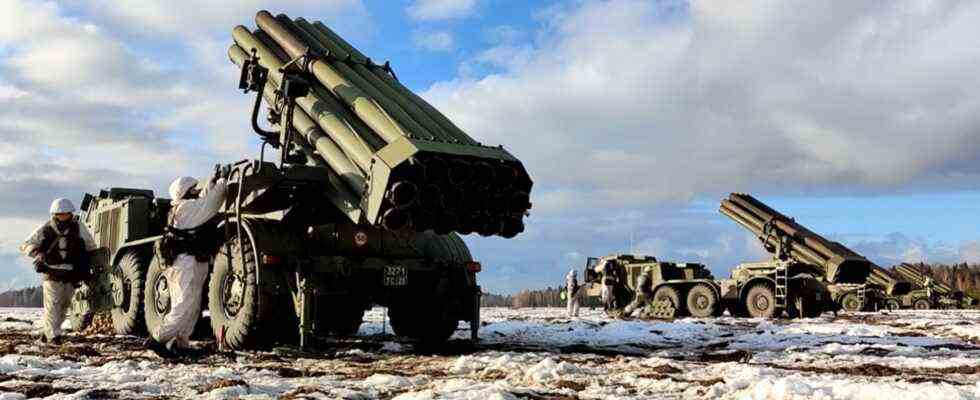interview
Status: 02/14/2022 7:54 p.m
Will Russia attack Ukraine on February 16? The concrete warning from the USA has irritated the world public. The US expert Overhaus says in an interview who it is aimed at and what risk Biden is taking with it.
tagesschau.de: A warning of an attack by Russia combined with the naming of a specific date – how do you rate this action by the American leadership?
Marco Overhaus: It is very unusual for the US to issue such strong warnings, even linking them to predicting a specific date for a possible attack. It is probably most likely related to the fact that the major maneuvers by Russian and Belarusian troops are scheduled to last until February 20th and that is why this date was given. Of course, I can’t say what exact secret service findings are behind it.
To person
dr Marco Overhaus works for the Science and Politics Foundation in Berlin. In the Americas research group, security and defense policy is one of his main areas of focus.
Keep an eye on your own allies
tagesschau.de: Can you imagine that one of the goals of the Biden administration is to prevent the Russians from attacking on that very day by naming a possible date?
Overhouse: I believe that an important addressee of this warning is not so much Russia. The USA and the NATO countries have already formulated demands and warnings towards Russia. That is why our own NATO allies are probably an important addressee.
If Russia invades Ukraine, NATO and the EU will act as one. After this drastic warning, no NATO state and no EU member can avoid carefully considering what must happen in such a case.
tagesschau.de: Does that possibly mean primarily Germany, whose course has repeatedly been criticized in recent weeks?
Overhouse: Germany is certainly an important addressee of American information. Germany’s position is not secure on all issues, if you take Nord Stream 2, for example. But there are other allies in NATO’s south and west who don’t see Russia as their greatest threat. With the American warning, however, NATO is fully focused on the situation in Ukraine.
“Show Putin a red line”
tagesschau.de: Could the experience of 2014, when Russia annexed Crimea using soldiers without insignia, play a role here?
Overhouse: The comparison with 2014 lags insofar as this time it would not be about “little green men”, but about open Russian aggression with announcement. However, 2014 could play a role in US strategic considerations to the extent that, at least in retrospect, many in the Biden administration are convinced that NATO did not react decisively enough, was caught off guard by Russia’s hybrid warfare, there were only relatively moderate economic sanctions afterwards and only a relatively moderate expansion of the military presence on NATO’s eastern flank. This time, the US wants to act faster and more decisively, showing Putin a red line.
tagesschau.de: Does the US perhaps want to make it clear to the Russian public who the aggressor is in the event of war?
Overhouse: From the outside, it is difficult to predict which message will be received by the Russian public and how. For the US, it’s more about being prepared for eventualities – for a further escalation, which would then involve NATO countries directly. That is why the USA and other countries have also moved additional troops to Eastern Europe. The United States, on the other hand, has made it clear that it is not prepared to go to war with Russia over Ukraine.
tagesschau.de: Which states are the main concerns with a view to a possible further escalation?
Overhouse: Of course, the main focus is on the three Baltic countries, but also on Poland, Romania and other south-eastern allies. In its “draft treaty” addressed to NATO, Russia, with a view to security guarantees, also demanded, among other things, that NATO should reduce its presence in the eastern alliance countries to the level of May 1997 – that is, effectively end it. NATO could not and would not meet this demand.
Danger for the domestic political agenda
tagesschau.de: Biden wanted to focus on domestic politics and dealing with China. Now he has to deal with Russia. Is that politically risky for him?
Overhouse: Biden is taking a risk if he ups the ante now from an American perspective. He took office with the goal and the promise of putting the USA back on its feet economically and structurally – “Foreign policy for the middle class” was the slogan. A crisis in Eastern Europe is not helpful here – it distracts from the domestic political agenda. Many Americans reject the role of world policeman for their country – that’s why Donald Trump was elected in 2016 and is also why it continues to be popular.
The leeway for an active foreign and security policy has therefore become smaller for a US president. But if Biden did nothing, he would face accusations of inaction. At the virtual Munich Security Conference of 2021, he declared that the US was back on the world stage. In this respect, he also has to lose credibility in foreign policy here.
tagesschau.de: How do you see it: does diplomacy still have a chance?
Overhouse: The room for maneuver for diplomats is currently being reduced significantly. But that doesn’t mean the situation is hopeless. It’s just very difficult, because the Russian leadership has gone very far with their threats and demands. It is difficult to imagine how Putin can back away from this without losing face. But the US has now upped the ante, too. This also has a pull effect that makes it difficult for all sides to find a face-saving diplomatic way out.
The conversation was led by Eckart Aretz, tagesschau.de

